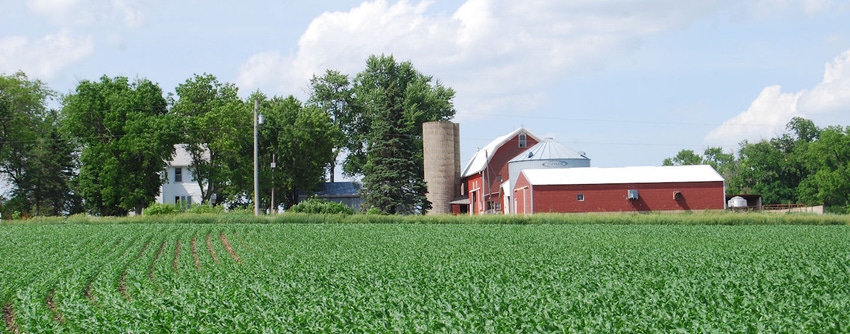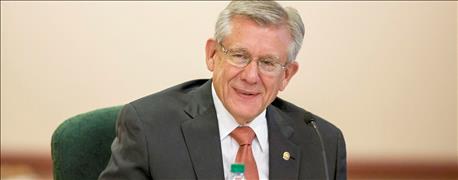
Like a lot of Illinois success stories, Ed McMillan’s began on a farm in rural Illinois. The son of tenant farmers near Walnut Grove, Ed had to carve out a career off the farm. He spent 28 years with Purina, including 8 years as CEO that began when he was just 41. Since then, he’s served on 15 corporate boards and today serves as chairman of the University of Illinois Board of Trustees.
Known as a thought leader and a servant leader among his peers, Ed shares insight into how he’s affected change, built consensus and influenced Illinois agriculture for good. (Our words, not his!)
Where did life start for you?
I grew up in McDonough County near Walnut Grove. Dad was a tenant farmer and a purebred sheep breeder who was sheep superintendent at the Illinois State Fair, and sheep superintendent at the Chicago International. My brother and I got into livestock at an early age with sheep, and then got into the cattle business when I was 10 years old.

SOLVING PROBLEMS: “My approach to dealing with problems is to sit down with people and listen to the pros and cons,” says Ed McMillan, chairman, University of Illinois Board of Trustees. “Sometimes you hear things you don’t necessarily agree with, but there’s perspective there that you have to understand.” (Photo: UI News Bureau; L. Brian Stauffer)
You graduated from Illinois in 1969 and started at Purina right away, becoming president and CEO when you were just 41. Did you know you wanted to be president then?
Absolutely not! I started in sales in Purina, and I felt they were a company that would develop people. They put people in lots of different jobs to get experience. We moved 6 times in 7 years. I was so challenged with every job I was in, and they kept moving me into new ones. I tell young people: focus on doing the best job you can at the job you’re in, and then people will recognize you – and quit worrying about where you’re going next in your career.
What did you do for Purina that no one else could have?
Made a lot of mistakes! When I became CEO in 1988, it was a time when the animal feed industry was evolving and changing and consolidation was happening at the farm level, where there was real financial trouble. We were trying to adapt our products, adapt our marketing approach, adapt how we both served the smaller farmers and at the same time, serve the big and growing farmers. There was a lot of conflict in that. So if anything, I brought value in that transition. I grew up valuing hard work and understanding how important the animal side of farming was for farmer profitability.
How do you approach a problem – and then solve it?
I’m a generalist. I know a little about a lot of things, but I don’t know a great deal about any one thing. As a result, my approach to dealing with problems is to sit down with people and listen to the pros and cons. Sometimes you hear things you don’t necessarily agree with, but there’s perspective there that you have to understand.
The other thing is to build a group of advisors that you trust. I had a group 5 or 6 at Purina and I valued their opinions, their ideas, their thought process. I’d let them debate before I’d ever come up with an answer. My management style is collaborative leadership and collaborative management.
Maybe that’s what we’re missing in the country today! We don’t have enough people who will sit down and absorb all of the different issues and try to come to a solution.
Considering the administrative turmoil at U of I during your Trustee tenure, how do you build consensus in a group?
I’ve discovered that once people start listening to pros and cons and they start trying to defend their positions, in many cases, that’s when they really start listening to other people’s opinions. Up until then, when they don’t have to encounter other people’s rationale for why they believe something, they tend to be very polarized to their own ideas. If you can get them to get it out on the table – not argumentatively but just the facts – some people can say, “I understand your side of the issue and I see why you’re saying that.”
How have you known when it was time to make a change in your life?
I’m not sure you ever know. The ultimate question is, “When do you have time to take on more thing and when don’t you?” That’s when you have to make the decision: “Is this something I can really add value to?” I don’t like to get involved in stuff that I don’t think I can help. I think that’s the challenge, particularly for young people. As you get out of school, you have a tendency to want to do everything, which is fine – you have a lot of energy. Over time, you start to ask, “What are the things I really have time to do and can really add value to?” I’ve fortunate to be able to do things like that.
On young people in agriculture:
“The young leadership that’s coming up in agriculture is even better at being proactive supporters of their business, than many of us were when it was a lot easier.”
On the 2009 University of Illinois admissions scandal, which broke 9 days after he joined the Board of Trustees:
“That was a dark day for the University. For a lot of people.”
On Illinois ag leadership:
“The three big ag leaders in Illinois are the president of the Illinois Farm Bureau, the Director of Agriculture, and the dean of the U of I college of ag. They have to go out into the state and be proactive leaders, thought creators and outspoken voices for agriculture.”
On marriage:
“Without it being a team, neither of the members of the family can be successful.”
Truck?
Started out Ford, now Chevy
Tractor?
John Deere
Cattle?
Hereford
Team?
Cardinals
Chief?
Absolutely!
Technology?
GPS
Best decision?
Marrying my wife
Reading?
The Servant as Leader, by Robert K. Greenleaf.
Family?
Wife Judy; two adult children, Kyle McMillan and Kelly McComb; three granddaughters.
What do you admire in your friends?
Honesty, integrity, openness. I don’t expect loyalty from friends. I think you earn that. Your true friends will tell you what you need to hear.
What’s the lesson you wanted your kids to take away from their time at home?
When you go off to college, it’s the first step to developing a career. I worry about a lot of parents who don’t necessarily say that to their kids. We tried to teach ours responsibility and values, and growing up showing cows helped. We wanted them to go to college and find a career and be independent – and not be dependent. It’s a tough part of life, when kids are struggling. I struggled but my parents were supporting in wanting to help me find a place where I could have a career. And it worked out.
About the Author(s)
You May Also Like






